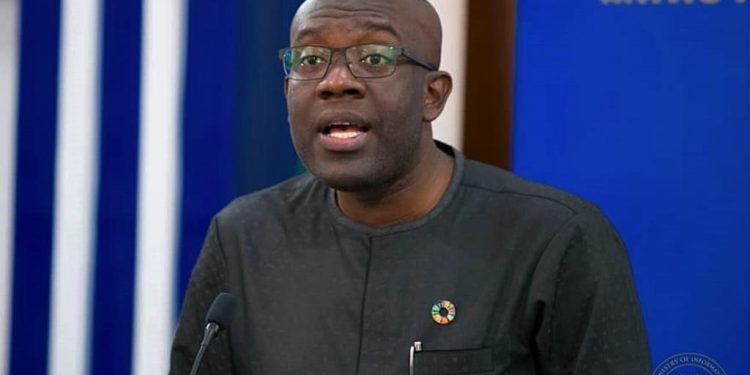Information Minister, Kojo Oppong Nkrumah, has revealed that Ghana’s negotiations with the International Monetary Fund (IMF) for a $3 billion bailout has so far gone as expected.
According to him, he is optimistic the country will reach a staff-level agreement with the technical team of the International Monetary Fund. He indicated that the government is currently going ahead to place before Parliament some policy measures to halt the depreciation of the cedi and control inflation.
Mr Nkrumah stated the measures will be contained in the 2023 Budget statement. He explained that the implementation of some of the President’s measures outlined in his address to the nation on the state of the economy are expected to restore investor confidence.
“So far the negotiations have gone on very well. We are expecting to go to Parliament to lay before Parliament some of those ones that the President has already mentioned, those are lower hanging fruits. They also show our commitment as a country to the kind of programme we’re looking to get because if you look at the old way the Fund used to operate, we have what we call the prior action. This will show some prior commitment to some of the things that we hope to do with the money.”
Kojo Oppong Nkrumah
The Information minister noted that government expects the mission by the end of November, and also have a “staff level agreement with the technical staff” when they come and do the final negotiations with Ghana before the end of this year.
“So fairly well, we’re hoping to conclude the staff-level agreement before the end of this year.”
Kojo Oppong Nkrumah
2023 budget statement and IMF
On his part, economist, Dr Theo Acheampong, revealed that the 2023 Budget statement will determine the fate of the country. He noted that this budget will signal to the international community the government’s commitment and strategy to fix the broken economy sustainably, thus a failure to do so as expected could result into a total loss of confidence from the international community.
“Because that budget is what is going to signal to all of us whether the government is really determined to fix this problem and to put the economy on a sustainable footing going forward. So, everybody is expectant and everybody is looking out for what is communicated in the budget on raising revenue; on the expenditure side of things; how we’re going to address the deficit and the financing of that deficit…”
Dr Theo Acheampong
Dr Acheampong questioned the role of the Central Bank in terms of the inflation targeting framework and other social mitigating support package the government will offer to citizens. He explained that all of these are issues that many market participants and many observers are actually looking out for in the 2023 budget.
Dr. Theo Acheampong cautioned that there cannot be a disconnect between the budget statement and the staff-level agreement from the IMF which is projected to be reached by the end of this year.
“Because ultimately, if the budget is read and we’re talking of a staff-level agreement by December or early January, what that will do is to send a strong signal or confidence to the market participants or players that what you would expect in that staff-level agreement wouldn’t be any different from what you’re actually seeing in the budget.”










Discussion about this post